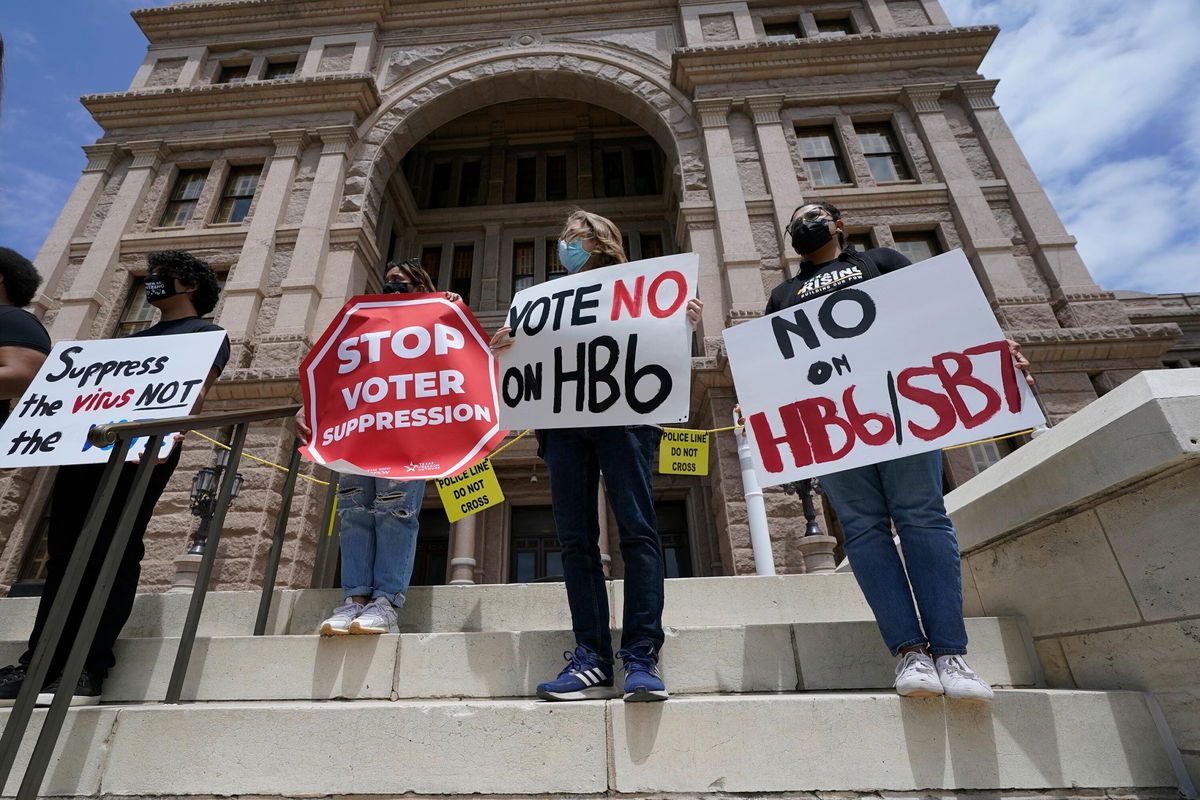Texas Republicans set to resume push for voting restrictions as special legislative session begins

People opposed to Texas voter bills HB6 and SB7 hold signs during a news conference hosted by Texas Rising Action on the steps of the State Capitol in Austin
By Eric Bradner, CNN
Texas Republicans are set to mount another push for restrictive new voting laws in their state as lawmakers on Thursday begin a 30-day special legislative session that Gov. Greg Abbott says he wants to see focused in part on “election integrity.”
Abbott released an 11-item agenda for the special session that includes a raft of issues designed to appeal to cultural conservatives, among them social media censorship, banning the teaching of critical race theory in Texas classrooms and banning transgender students from competing on sports teams that correspond with their gender identities.
But voting measures — particularly Republican proposals designed to stop expansive practices such as drive-thru voting and 24-hour voting allowed by Harris County, the home of Houston, during the 2020 election — are expected to be the political flashpoint, and one that commands national attention.
Lawmakers will be picking up where they left off five weeks earlier, when Texas House Democrats walked off the floor in the waning hours of this year’s legislative session to block the Republican majority from having the quorum necessary to pass Senate Bill 7, a measure that would have made casting mail-in ballots harder, banned drive-thru voting centers, empowered poll watchers, made it easier for courts to overturn election results and more.
It was an unusual defeat for Republicans, who control every lever of power in Texas. The GOP has sought to hang on to that power as the state becomes more competitive: Then-Rep. Beto O’Rourke finished less than 3 percentage points from winning a Senate seat in 2018, and President Joe Biden was less than 6 percentage points behind former President Donald Trump in the 2020 election — the closest margin in a Texas presidential race since 1996.
Democrats were particularly incensed over language in SB 7 that would have limited early voting hours until after 1 p.m. on Sundays — effectively barring Black churches from conducting “souls to the polls” early voting drives.
Key Republican lawmakers later said the restriction was a drafting error and they’d meant to allow early voting to start at 11 a.m., rather than 1 p.m., on Sundays.
In a letter to House Speaker Dade Phelan on Monday, Texas House Democrats accused Republicans of excluding Democrats from negotiations over SB 7 in the legislative session’s final days and adding new voting restrictions that hadn’t been discussed before.
“We are meddling with the very core of our democracy and with the most fundamental rights of our constituents. We cannot deliberate on these issues through a process that is at best a blundering mess and at worst a deceptive, hyperpartisan sham,” Democrats said in the letter.
A bill filed by House Republicans on the eve of the special session, House Bill 3, includes many of the same restrictions as SB 7 but drops the weekend early voting limits.
The Senate could advance its own measure, and it might take weeks for majority Republicans to determine the contents of a final election bill.
Lt. Gov. Dan Patrick had previously tweeted that two of the most controversial provisions — limits to Sunday early voting hours and language that would make it easier for courts to overturn election results — will be dropped from the version of the bill Republicans seek to advance in the special session.
“Neither will be in Special Election bill,” he said in a tweet Tuesday in which he also blamed the House for the language that restricted Sunday early voting hours.
The Republican push for new voting restrictions in Texas is part of a nationwide effort this year, inspired by Trump’s lies about widespread fraud costing him the 2020 election.
Already, Georgia, Florida, Iowa and other states with Republican governors and legislatures have enacted new voting restrictions. Texas is seeking to join their ranks, ahead of Abbott’s 2022 bid for a third term. In recent months, Abbott has increasingly embraced Trump, including announcing that the state will build its own border wall, as he faces a list of challengers from the right who include Allen West, who’s the outgoing Texas GOP chairman and a former Florida congressman.
There is no evidence of widespread voting fraud in Texas or elsewhere. But Republicans in Texas have largely based their arguments in favor of new voting restrictions on claims that any fraud is too much — and that current systems allow it to go undetected.
“Basing statistics on the occurrence of voter fraud of off convictions is like assuming the number of items stolen from a convenience store in a year is equal to the number of people convicted of shop lifting from a store,” state Rep. Briscoe Cain, a leading House Republican architect of the voting bill, tweeted Saturday.
The-CNN-Wire
™ & © 2021 Cable News Network, Inc., a WarnerMedia Company. All rights reserved.